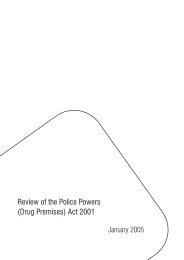Crimes (Forensic Procedures) Act 2000 - NSW Ombudsman - NSW ...
Crimes (Forensic Procedures) Act 2000 - NSW Ombudsman - NSW ...
Crimes (Forensic Procedures) Act 2000 - NSW Ombudsman - NSW ...
Create successful ePaper yourself
Turn your PDF publications into a flip-book with our unique Google optimized e-Paper software.
<strong>NSW</strong> Police does not support recommendation 20, on the basis that it “would add additional unnecessary delay and<br />
workload to the process for undertaking a forensic procedure.” 561 We believe that a record of the decision making<br />
process for senior police officer orders should be documented. Given that the matters we have outlined must be<br />
considered by the senior police officer, requiring a brief note recording the matters cannot conceivably result in<br />
unnecessary delay and workloads. It will, however, ensure compliance with legal obligations under the <strong>Act</strong>.<br />
<strong>NSW</strong> Police supports recommendation 21. 562<br />
7.3.4. Soliciting consent as an alternative to making an order<br />
As discussed above, police officers appear to sometimes seek to convince suspects they should consent to a<br />
proposed procedure, or police will simply make an order and carry it out anyway. We found evidence of this in<br />
the very low number of procedures conducted by order, through interviews with officers who saw it as their role to<br />
persuade suspects to consent, and in the many references in consent forms and COPS records to suspects initially<br />
declining to undergo forensic procedures, and then changing their minds at some point while in police custody. We<br />
recognise that in the case of DNA samples, many officers are acting in good faith, on the basis that the suspect<br />
should be convinced to consent to a buccal swab to avoid having a hair sample taken.<br />
The <strong>Act</strong> clearly anticipates that if a suspect does not consent to a forensic procedure, whether a DNA sample or<br />
another type of procedure, police should not proceed without an order. Our recommendation 19, about making<br />
buccal swabs available in the case of senior police officer orders, may go some way towards encouraging officers to<br />
seek orders by senior police officers in circumstances where suspects do not consent to procedures.<br />
As an additional safeguard, consideration could be given to amending the <strong>Act</strong> to require any senior police officer<br />
making an order for a forensic procedure to be independent of the investigation. This in conjunction with our<br />
earlier recommendation regarding the recording of the reasons for making the order would ensure the process is<br />
transparent.<br />
Recommendation 22<br />
The <strong>Crimes</strong> (<strong>Forensic</strong> <strong>Procedures</strong>) <strong>Act</strong> <strong>2000</strong> be amended to require a senior police officer making an order<br />
under sections 18 or 19 to be independent of the investigation.<br />
<strong>NSW</strong> Police does not support this recommendation, on the basis that it is unnecessary. 563 However, the Attorney<br />
General’s Department advised it has no objection to the recommendation, and commented:<br />
It appears to be implicit in the legislative scheme that the senior police officer exercising the power of<br />
considering whether to make an order must act objectively according to the statutory criteria, and so does not<br />
have carriage of the investigation in relation to which the order is being sought. 564<br />
This is consistent with our own view, and should be made clear in the <strong>Act</strong>.<br />
7.3.5. How senior does an officer have to be to authorise a forensic procedure<br />
The <strong>Act</strong> specifies that a “senior police officer” means a police officer of or above the rank of sergeant. 565 Some<br />
officers have asked whether this includes an officer who is an acting sergeant. The Police Association of <strong>NSW</strong> gave<br />
the following example:<br />
The suspect refused to take part in the conducting of the forensic procedure, so he had the supervisor in charge<br />
of the station at the time direct him. The officer was not a sergeant, but an acting sergeant. Later, an Inspector<br />
spoke with the officer and stated that the acting sergeant was not allowed to direct the suspect as per the <strong>Act</strong>,<br />
as the officer was not a substantive sergeant and therefore the procedure could be challenged at court…<br />
The officer has since spoken with other police who have done forensic procedures at other locations and they<br />
have had an acting sergeant direct the suspect to complete the mouth swab. 566<br />
<strong>NSW</strong> <strong>Ombudsman</strong><br />
DNA sampling and other forensic procedures conducted on suspects and volunteers under the <strong>Crimes</strong> (<strong>Forensic</strong> <strong>Procedures</strong>) <strong>Act</strong> <strong>2000</strong> 103

















